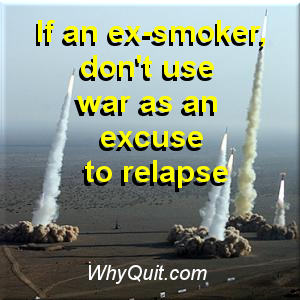
Ex-smoker? Don’t relapse over war with Iran.
January 7, 2020 John R. Polito
Contrary to old use memories, nicotine is not a stressbuster.
 Reports tonight that Iranian ballistic missiles struck two U.S. bases in Iraq, a 2013 study found that more one million ex-smokers relapsed to smoking following the 9-11 World Trade Center terrorist attacks. But why?
Reports tonight that Iranian ballistic missiles struck two U.S. bases in Iraq, a 2013 study found that more one million ex-smokers relapsed to smoking following the 9-11 World Trade Center terrorist attacks. But why?
It is natural and normal for ex-smokers to believe that nicotine is a stress-buster, that it calmed them during crisis. How could they not? They’d felt it happen hundreds or maybe even thousands of times previously. Or, did they?
Stress relief is possibly the most deeply engrained smoking belief of all. And this deadly belief certainly isn't news to the nicotine addiction industry.
According to a once secret 1983 Brown & Williamson research memo, "People smoke to maintain nicotine levels" and "stress robs the body of nicotine, implying a smoker smokes more in times of stress due to withdrawal, not to relax."
Said differently, stress accelerates withdrawal's onset. Sadly, what those million ex-smokers did on 9/11 was to fall prey to the influence of durable wanting satisfaction memories created by an actively feeding nicotine addict in need of more.
As with needing to smoke more when drinking, one of the physiological effects of stress or alcohol use is to cause urine to turn more acidic. As if attempting to protect the bladder from over-acidification, the kidneys accelerate removal of acid-neutralizing alkaloids from the bloodstream, including nicotine. This forces early replenishment.
GlaxoSmithKline's Nicorette website warns nicotine gum chewers that, "Eating or drinking even mildly acidic foods and beverages directly before using or during use of Nicorette inhibits nicotine absorption into your bloodstream."
The prospect of full-blown war with Iran at hand, tonight and in coming days, recovered nicotine addicts would be wise to recognize that never once in their life did nicotine relieve anxiety. What it did was to relieve nicotine’s absence.
It’s easier said than done. Countless times previously, an intense need for replenishment was satisfied by arrival of a new supply. It left us totally yet falsely convinced that nicotine was an emotional solution to crisis.
For example, a never-smoker and a smoker both experience flat tires while driving in freezing rain. They stop, get out and look at the flat. The never-smoker sighs and then immediately reaches for a jack to begin changing the tire. And the smoker reaches for ....? That's right, a cigarette. But why?
Stress, anger, worry and fear cause release of hormones which quickly turn urine more acidic. The problem is that the speed or rate by which the kidneys remove and eliminate the alkaloid nicotine from the bloodstream is directly tied to urine acidity (Schachter 1977).
Thus, the more stressful the event, the more stress hormones released, the more acidic our urine, and the quicker we sensed withdrawal's onset.
In one study, an increase in urine acidity from a pH of 5.6 to a pH of 4.5 (making it 11 times more acidic) caused a 206% increase in the rate by which the kidneys eliminated nicotine from the bloodstream.
The further from our last nicotine replenishment when stress occurred, the more noticeable the decline in dopamine, and the sooner and more intense stress induced wanting was felt.
The bottom line, the ex-smoker's brain long, long ago fully adjusted to functioning during crisis without nicotine.
But just one puff and up to 50 percent of brain dopamine pathway receptors would become occupied by nicotine. Just one puff, and you may soon find your brain wanting, plotting to obtain or even begging for more.
Don’t let the prospect of war with Iran deprive you of freedom. You’re smarter than that!
Related Stress Reading and Videos
New Reactions to Anger as an Ex-smoker
"Use relieves stress and anxiety"
Resources regarding interaction between nicotine and stress

Written 01/07/20 and reformatted 02/02/22 by John R. Polito
